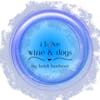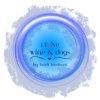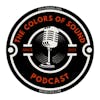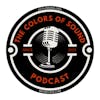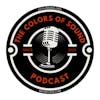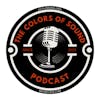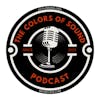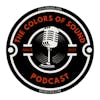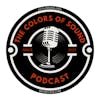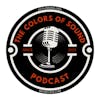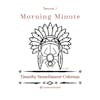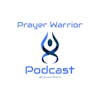
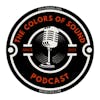

The Colors of Sound Podcast
Season 2, Episode 1
Color Me Mozart Interview
WDON1204.com
@ColemanGlobal
Our mission is to create a safe space for community members from around the world to share their personal stories. Listen on all streaming platforms or on our podcast station, WDON1204. com. The Colors of Sound podcast. Discover how much we have in common.
--- Send in a voice message: https://podcasters.spotify.com/pod/show/colemanglobal/message Support this podcast: https://podcasters.spotify.com/pod/show/colemanglobal/support
In a world where so many things are vying for your time, I just wanted to say, Thank You for your attention.
In Unity,
Timothy
WDON1204.com is proud to present our latest podcast, The Colors of Sound.
Our mission is to create a safe space for community members from around the world to share their personal stories. Listen on all streaming platforms or on our podcast station, WDON1204. com. The Colors of Sound podcast. Discover how much we have in common.
Welcome everybody. My name is Timothy Stonedancer Coleman. This is the Colors of Sound podcast. Today, I'm so excited to have my friend, uh, Adrian Edward with us. Uh, he is the CEO founder of Color Me Mozart. We had the privilege of working together in New York City public school system for a few years, uh, where he served communities, uh, all over the city.
But for me specifically, we were working together in the South Bronx.
I'm Esther Berman. I'm a licensed behavior analyst. I work with all children, K through adulthood, and we've been using Color Me Most Art for over a year now. Lucas is really enjoying music and understanding concepts, new concepts, and learning music earlier on.
That's just gonna, he's gonna excel by the time he's like 15, 16 years old and even higher. But I've just noticed, like, in school, we just had his parent teacher conference, and she told me how well versed he is in communicating and just his language. And you just open up the book, and follow it along, and you're able to apply it in real life on a piano or a xylophone.
So it is really easy. And if you don't know... I, what I love most is that their website is so easy to navigate and, um, you can print stuff off and apply it in your own environment. So it's really, really great.
Please help me in welcoming Adrian Edward to the colors of sound podcast before color me Mozart. What were you doing and what kind of led you up to the point of developing your company? Absolutely. Yeah. So interestingly enough, I'd love to sit here and say, Oh, this has been a dream of mine, you know, for the past 40 years, it wasn't right.
But life has an amazing way of kind of, uh, taking twists and turns that like changes forever. Music was one of those things. I didn't, uh, grew up in a musical family. We, my dad was a painter, but I never tried music. And I tried my first class in high school and it was love at first note. As soon as I saw piano music and I saw a piano, I'm like, I don't know why I had been flaky about everything in life up until that point.
And then music just made sense to me and I loved it. But I have always been a fan of learning, uh, like different approaches to education. I was a kid that learned differently. Um, I know if it was in, in today's years, if I was a kid now, I definitely would have been diagnosed with some type of Attention deficit disorder stuff like that.
So it that the the one way of learning never worked for me So I always looked for different ways So I knew that I wanted something in the future. Uh, once I started learning music or even any Part of education. I really appreciated those people that search for different methods of education so all throughout the years it just kind of started making I started teaching privately and I had my own way of teaching and It came from such a healthy place because I genuinely loved music and I loved when my students would get that aha moment I love helping people fall in love with music Fall in love with just art and creativity and using their creativity and things like that And it wasn't until I worked, you mentioned that from my bio, um, I had the pleasure of working at a preschool as a music therapist.
And there just wasn't any great curriculum that I needed to use. So I'm like, you know what, I'm going to just, I'll do it myself. And, um, it was, it was from there, uh, that it kind of birthed to what it is today. And I could never be more grateful for those kids. I always say it and not to sound corny, but they changed my life.
Way more than I hope I changed them, you know in the most positive way But they really just redirected my focus of like what it means to offer somebody the joy of something that perhaps wouldn't otherwise have the opportunity. That's when my mind exploded. The first thing is, you know, with the ADHD, I think I developed that in my adulthood, like bouncing around, like all these different things.
Uh, so I definitely can feel you on that. You know, there are a lot of companies and organizations and you know, this, um, that go into schools and it's like, This is our box. This is what we've created. Accept it as it is. We don't modify it like it's going to be what it's going to be. And, you know, kids are humans too.
And, and everything doesn't work the same for every human being. And so what I love with Color Me Mozart is that even as I watched you in the classroom and I watched video of what you guys were doing, uh, with the kids. A lot of it during covid, you know, online hybrid kind of stuff. Um, what I loved was that you were al you're always in a mode to adapt to the moment I follow you on LinkedIn, which I hope a lot of folks, you know, take a minute to, to tap into what you're posting and what you're doing on LinkedIn.
It's really phenomenal. Um, but what is kind of driving you forward at this point? We're using music as a tool for non-musical goals and that already was like boom, right? That changed everything. So this goes back to let's say sports, right? Sports are great, right? But it's really the bend not every kid's gonna be the next, you know, Tom Brady or you know And I don't even know enough about Messi or I'm a big soccer fan, right?
So but what do we learn from sports? sportsmanship team Leadership consistency dedication passion all these things. That's really the lesson. That's what I realized What music did for me is it really about that one song about playing Mozart or Beethoven? It doesn't matter what we really want is to get all those nonmusical benefits.
And so My thinking always is we need to [00:06:00] get kids into learning the language of music in the same way they learn, uh, at home, whether it's English, Russian, Chinese, Spanish, I grew up in a two language household, the benefits, the cognitive benefits that come from that, the confidence, the socialization, the, the, the turn taking, the gross, the finding gross motor skills, all these other things, how we get there doesn't really matter.
We can use, I can use, let it be by the Beatles, or I can use, uh, Mozart piano concerto. It doesn't make a difference, the kid's not going to know the difference, but the goal is exactly the same.
In our lessons, we always encourage, hey, let's listen to salsa, to tango, to hip hop, to, uh, bluegrass, to jazz, to fusion. What do you like the best? That's what we want to get to. Now you create your own. You use your creative powers to not just Sit there and receive. We want kids to be active. I've been reading so many fascinating neurological studies when a child actively participates in music.
The amount of his mind that lights up in those scans is mind boggling. So if I wasn't even convinced enough before now, science backs it up that just singing along is not enough. Participating is what changes a kid's life. A lot of what we see is, um, you know, a very traditional, sterile, I'm standing in front of the class, this is what I've got to teach, you need to learn it, here's a test, why did you do so bad, right?
Like, and it is, all the pressure's on the kid, right? So then, you know, now, it's, it's um, it's very like, hands on, I can participate, I can feel confident in what I'm doing. What I love about one of the things that you said about Color Me Mozart is, and, and kind of your path is that you are helping teach for things even outside of music.
You're helping teach for life. Right. Right. And developing these skills that, um, young people can use for life. But I want to also tap in for a quick second, because you say that you work with a lot of private students. What's the age range of Color Me Mozart? Like, what is the age range of folks that can, can receive the information the way that you're teaching it?
Yeah. So when you mentioned in my bio, I keep, I, and I still do, I love teaching privately, that ranges everything from, I'll have a, you know, four year old doing some drums to I might, one of my, actually one of the professors from collegiate, he does rock and roll guitar. He's a big Springsteen fan and always want to play.
So I just love giving people that access. Right. But when it comes to call me, most of our focus was early development. So. It's really geared towards the preschooler, kindergartner, and first grade in mind. We want to catch those early years. And I should explain this detail for those listening. What we actually do is empower teachers and parents to do this.
This isn't a music teacher thing. You do not need to know. You do not need a music degree or to be a music knowledgeable. We wanted to make this so basic. In the same way that no teacher or parent would ever fear teaching their kids shapes and colors and letters, we sit there and we're like, okay, let's sound it out.
Let's say a, let's say B, what color is that? What shape is that? That's how far we've broken it down. And we're really empowering the teachers and the parents. To be the ones that offer it to their kids. We wanted to take ourselves out of the equation instead of it being great. Now I need that specialized teacher to come in that specialized, you know, not every family could afford private lessons.
It'd be wonderful, but that's not how life works, you know? And, but this way, the same way a child learns their native language or even a second language. That's what we wanted to do. But the program is specifically, I would say ages four to six, but those grades in mind, uh, preschool, kindergarten, and first grade.
So talk to me because you just dropped a golden nugget and I don't want people to miss it, right? You just said that even parents. Who might be nonmusical in a traditional sense, right? I'm adding that part, of course, but for parents being able to actually do this at home and work with their children, like, what does that look like?
What does that feel like? Yeah, so that that's again, maybe maybe boiling it down to a simple explanation of the same way a parent would read their child the story at night, right? No parent would think twice. Well, I don't have a degree in literature. I can't read. That's a good analogy. Yes. We, we don't talk that way, but for some reason, I don't know why I love to know, maybe one day I'll research this.
I don't know why we've complicated the explanation of, and we're talking foundational music, right? We're not talking this, you know, this child is going to come out of kindergarten playing a Rachmaninoff concerto in Carnegie Hall, that's not what we're talking about, right? But in this case, it's as simple as.
Parents sit down and they learn together with their child. They'll watch a video together, they'll play on their instrument, uh, which in our case includes a xylophone or a color-coded keyboard. And in the same way that a three four year old can pick it up, that parent can also follow along and guide them through it and practice them through it.
And inadvertently, which was my little sneaky plan along, along the way was, parents and teachers don't know they're learning music and then they wake up one day and they're like, Wait a minute! Now I know 40 instruments from the orchestra. Now I know how to read. Uh, middle C to high C. I know what the treble clef is.
I know, uh, what violins are supposed to sound like. I know what professional music notation looks like. That was our goal. Where you're learning without knowing that you're learning. What's the next level that you're, that you're taking it to? And, and what are those like Things that might be on your private little notebook checklist, right?
You're like, Ooh, one day I'm going to be able to do this, right? Like what's that next level? Yeah. So we have, let's say actual products, right? Like picture bar book coming out. We just released a coloring book, our level four workbook, all those practical things, a teacher certification, which was really important to make sure teachers are trained correctly, but at the heart of it really, where all the energy is going is making sure that the schools.
And parents for that matter, you know, homeschoolers and, um, parents that do this at home with their kids, that they're successful, like going above and beyond on that, uh, just feeling that they're part of something, not just, Oh, we got something great. I bought an exercise machine and it's sitting there.
What do I do now? If they do hit a stumbling block, we're there to explain it. Every other video has a musician from around the world. So for teaching about the harp, we have this wonderful harpist from Hong Kong that just. Uh, it explains the, the, the, the harp. We have a trumpet player from Italy that does that.
So they get to see music is a world thing that transcends all cultures, all ages, everything. The rhythms that we hear between six months and 12 months. Yes. When we're an infant are the rhythms we feel most comfortable with for the rest of our lives. Which blew my mind and then I started thinking right full disclosure here I am from Argentina, but I do lack some Latin rhythms inside We didn't grow up with them So my wife is over there dancing salsa like she learned it all her life And I'm over there with two left feet because I didn't I didn't listen to that So I tell parents all the time play music in the house, even if it's not your style try different things Because kids are a sponge and they absorb it.
So that's so funny because we grew up like in my family, we grew up on jazz and gospel music, right? So there's not there wasn't a whole lot of breakdancing and whatever, but I've got a killer like step touch. You know what I'm saying? Like, this is my choir move is like the best I got, you know? Between six and 12 months.
That's really amazing. That's amazing. Again, just making teachers and parents aware of the value that this has beyond the music and the world that it opens. It has nothing to do with them becoming professional musicians. It's about exposing them to a completely new way of communicating with the world around them that otherwise they wouldn't have.
I love it. I love it. You know, I, um, In, in school, I remember when I made it to, uh, to middle school, and I remember when kind of all the bullying set in and like all the different, you know, changes of life in your body and the, and this is, you know, everything around you. It wasn't until I got into, um, uh, choir to the chorus, uh, that I actually started to.
feel confident about myself and confident about, you know, just my outlook. I wasn't a sports person and I wasn't like a brainiac, you know, so it was like, okay, where do I really fit in? And once I got locked into music, the confidence carried over to other subject areas. Right. And so, uh, you know, I can only imagine when you're exposing youth at such a young age to Color Me Mozart and the program and, and the theory behind the accessibility of your program.
Um, What they'll go on to do even beyond, uh, beyond that. And, and again, I get it. The goal isn't that every kid is going to become the next, you know, Mozart or Beethoven or whatever, but you never know, how are, how are you helping grow this other than the direct work in the classroom? And of course, as we said before, with parents who kind of like learn the process and are able to do this with their students, with their children.
No. Yeah, absolutely. It's Argentina. We, I would love to get it to Argentina, but right now it's been kind of fascinating the past few years. We had a couple of like great surprises because, um, there was a music teacher in England, um, uh, that fell in love with the program. They were using another program and she said, we want to do it here with my husband.
And so she's opened up kind of our wing there, um, in Bristol, uh, UK, and it's just been, Fascinating. Because again, just one of one of us, right? Like that, the passion behind just sharing with, with like youth. And she's just like, I don't know, it's just a lovely to like see someone that I never would have considered, right?
How would I reach somebody in England other than maybe through social media, that type of thing? That's right. She has our branch there. Then she started implementing in different preschools there. We have another teacher in Portugal that, um, just applied for a grant with the government to do a program in Portugal, we have Australia, we have Mexico, and so just seeing the fact that everything that we're mentioning now, it doesn't just apply to, hey, here in the States or Canada, let's say, the fact that Everyone, all these people that write in, they tend to have a very similar reaction.
Oh my goodness, this is what we needed. This makes sense. So it's kind of more of my way of thinking as a piano teacher. Like I need a curriculum like this. Like I would have benefited from this, you know, and I say that in the teacher certification too, like I'm giving you what I wish I had, you now.
And so that reaction has been wonderful. And so we're doing our best to, um, not only help, obviously it's hard from perspective of being here in the States, but it's getting very close. We've been able to ship the program to other countries and we're hoping by next year, by next summer, um, cause we're doing a few conferences, homeschool conferences, cause that's a big.
Part of like, especially since the pandemic, a lot of parents have opted for homeschooling because I know you, I know that even if one kid got it, you would be overjoyed, right? But the fact that you have this building and growing, um, in an exponential way is so phenomenal to see and watch. And so I pray, you know, much, much success and blessing upon you and your family, um, in all that you're doing, because you're approaching it with the people.
in mind and you're approaching it with an open heart, you're willing to learn, you're willing to, you know, develop it and keep it rocking. So, you know, I guess as a final thought, um, you know, what is the, the overall takeaway for someone catching this podcast, learning about. Uh, Color Me Mozart for the first time, uh, hearing everything that we've spoken about.
I'm sure many people have multiple takeaways at this point, but from you, you know, what is that final takeaway that you would say to folks, um, at this point? I would say whether you fall into the category of being a teacher that teaches young kids. Um, or a parent that has young kids in mind, don't underestimate the power that music has to change their lives, and don't, don't listen to what's been told to you that it's complicated or out of reach or not within the possibilities to offer your, your, your kids or your students.
Um, it absolutely can be. Um, and it's been complicated for way too long. And just to let them know that the benefits that it has beyond the music are immeasurable. Studied by everything from neuroscientists to, you know, uh, your, your, your family that will tell you, yes, music is a part of our life. Like anecdotal, uh, multi-generational music being passed by music has that power to unite.
Do not deprive your child or students of that experience. It would be tragic, to say the very least. Every student, every teacher, the principal, the superintendents, everyone that experienced, uh, Color Me Mozart was extremely thrilled by the work and and development of things that the kids created, uh, on their own.
I loved what you said about, you know, getting out of the way and and allowing it to take place and watching it grow and watching the classrooms thrive. Um, you know, the the... Best thing I think we could do in certain situations is try and make ourselves obsolete so that people can own the learning and, and the benefits of that come behind that.
So, you know, thank you so much for your approach. Thank you again for joining us. Share your story on the Colors of Sound podcast. Our mission is to create a safe space for community members from around the world to share their unique stories. Do you have an interesting story to share? Or perhaps a journey of triumph from a challenge that you faced?
Do you want the world to know about your talent? Visit our website and complete our guest intake form at WDON1204. com. The Colors of Sound podcast. Discover how much we have in common.
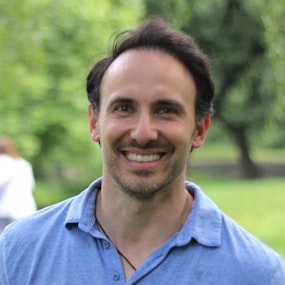
Adrian Edward
Author
Adrian Edward was born in Buenos Aires, Argentina, and grew up in New York. He received his Bachelor’s Degree in Music Performance as well as his Master’s Degree in Music Education from Hunter College.
As a music teacher and therapist at The Guild for Exceptional Children in Brooklyn, NY, Adrian discovered the need for an easy and effective music learning system for younger children. Out of that need and dream came Color Me Mozart, a music learning program for young children that helps them succeed in all areas of life through music.
For over ten years, he served the special needs community with his innovative approach to teaching. Adrian has been praised by both parents and educators for bringing music into the lives of children and their families. Adrian also teaches at the prestigious Collegiate School in New York City and maintains a roster of private students of all ages.
Featured Episodes
Check out the latest podcast episodes from our channel.









